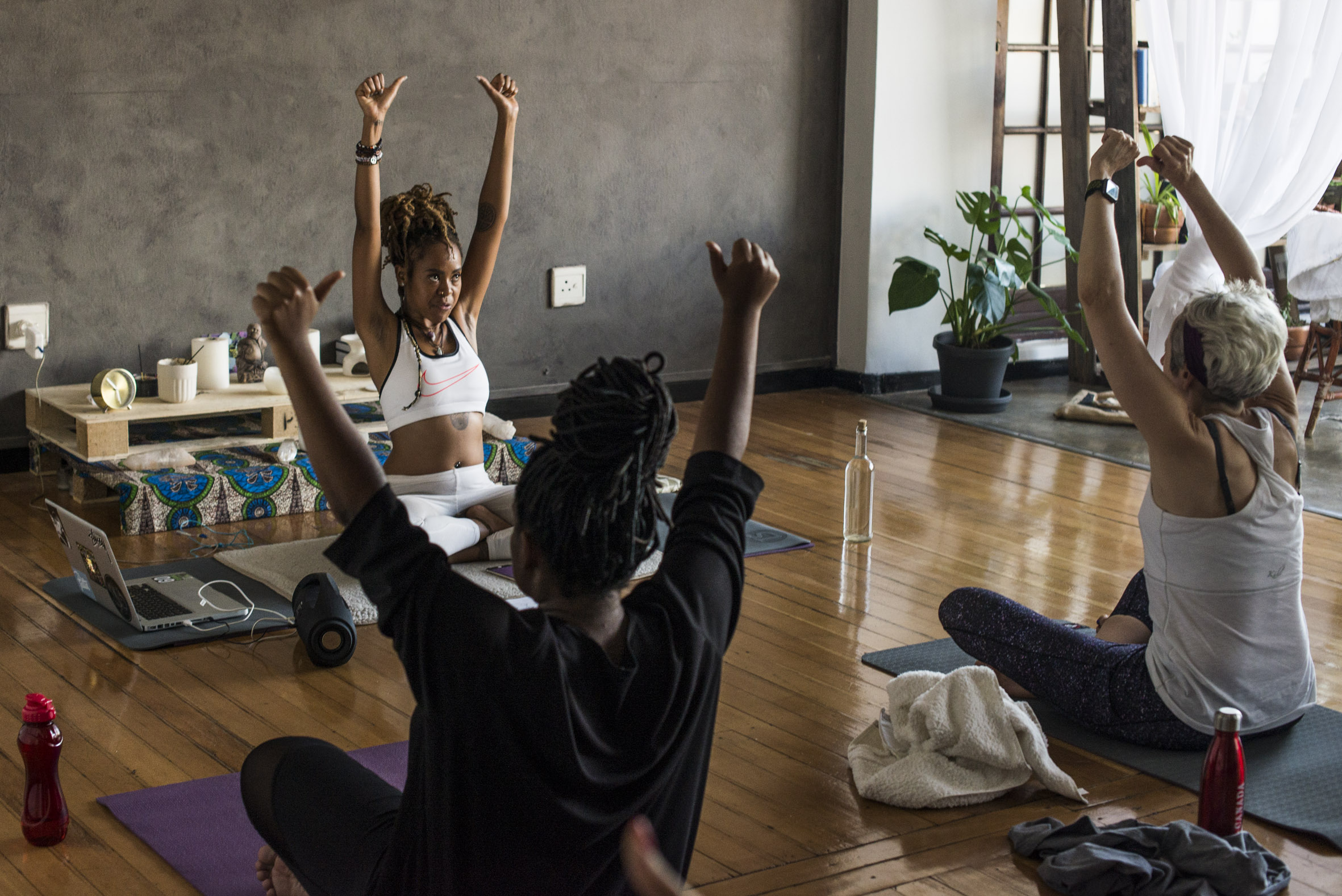Nesting: Banesa Lolauoa Tseki (left) and Anesu Mbizvo (right) have created a yoga, meditation and healing centre in Greenside. Photos: Delwyn Verasamy
Anesu Mbizvo was born in Zimbabwe where she lived until she was 12 before moving to South Africa. In her final year of medicine at the University of Cape Town (UCT), she began to study yoga. But, after practising for just over a year, she is now a fulltime yoga teacher.
Banesa Lolauoa Tseki was born in Lesotho and, being the daughter of academics, she was raised between the Lesotho, the United Kingdom and the United States. She first came to South Africa as a student at UCT. In what she felt was a conducive climate for exploring an alternative way of living, her path of self-discovery was through kundalini yoga.
Now Mbizvo and Tseki, who are both 27, have opened a yoga studio in Greenside, Johannesburg.

Banesa Lolauoa Tseki during a kundalini yoga class. Photo: Delwyn Verasamy
What is the intention of your yoga practice?
Banesa: It can’t even be commercialised because it’s who we are. So the first thought wasn’t to commodify it.
Anesu: This evolution of wellness is kind of taking over the world and it’s so easy for the African voice to be lost. We are connected to our earth, our land, to each other.
As black women, we’ve already taken part in so much self-work just to navigate everyday life. If we’re going to survive we need to do the work to know that we’re enough and worthy, just to function. We need to be awake. Sometimes I find it helps to have teachers who know what that work feels like to guide you through the work that you’re doing. So to have someone empathetic to guide you through that journey is very healing.
Why did you open the Nest?
A: I think it was being a teacher and seeing, it was almost, like, one face looking at me. It was a face of privilege looking at me as a teacher and me feeling like that was wrong.
B: If yoga is about liberating, it should be trying to liberate everyone. I think that was the plan.
Why is there a need for such a space?
A: I think the human condition is one of learning and finding yourself. I think that’s why we’re all here. So I don’t think there’s anything specific about our society that says, okay, now yoga is important. It’s always been important to find yourself. And I think that’s what this is for. We need to heal in order to find our true selves.
What ideas do you want to share?
A: I want to share the idea of yoga being a practice solely for you. It is a practice of self. It’s been portrayed as a practice where you show others what your body can do. That’s not what it is; it’s a practice of self.
Everyone is the perfect yogi. Everyone is good at yoga,. Everyone is advanced because we all have a self that we’re trying to explore and connect with. It’s become a game of comparison
B: Yeah, it’s almost like a sport and that’s not yoga.
What are your founding principles?
A: At the core is inclusivity. When you include everyone there are so many other values that come: love, compassion, understanding, patience. It was about creating a wellness space where everyone felt at home. Regardless of everything that they were going through and what society was feeding them, they would come here and feel deeply at home.
B: The people who hear about inclusivity and feel like they’re being excluded need to reassess why. The fact that the existence of the space is radical is problematic.
What services do you offer?
A: We have yoga and meditation classes — all different styles that are accessible to everybody. We even have kiddies’ yoga that starts from three years when their bodies are ready to take on yoga.
There’s also a consultation room. One practitioner offers reiki, the other offers reflexology and the other specialises in massage. Our goal is to become a one-stop shop for your healing.
B: We also have workshops because we want people to start getting re-educated. We want to give them a reminder. That’s what this is about. Rediscovery.
What do each of you bring?
A: I think I bring the light side, the nurturing, reassuring and calming people down. I bring the “everything will work out” reassurance. I think I’m the nurturer of the group.
B: I bring a bit of grounding. I have a background in marketing and branding. While she was training to become a medical doctor, I was out there building personal networks. I get us out there.
How will you ensure that this space continues to put wellness first?
B: We will ensure this by staying within the practice. We need to be doing the yoga and the meditation. Some of the yoga studios that I worked in, you find that the owner is no longer doing and teaching yoga and meditations. That’s when you lose it because they’re working in a different mindframe. But we are committed to our practice.
A: I think it’s amazing to be a yoga teacher and to have a business because you can see it when your ego gets into things, you can see when you’re over-attaching, you can see where you’re pulling things in the direction that they shouldn’t be pulled. Because you have the tools and you’re constantly telling others to do the work, you get forced to do the work.